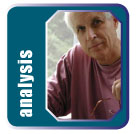By Winslow Myers
The way the United States has chosen to approach the chaos of the Middle East has far more frightening implications than we think, especially in terms of the world our children will inherit. If we are honest about how our adversaries perceive us, we will have to admit that there is a grand cycle of violence and insult operating, in which we ourselves are implicated up to our necks.
If we are to have any chance of breaking this potentially endless cycle (our military bases in Saudi Arabia leading to 9-11; 9-11 leading to the second Gulf War, Guantanamo and Abu Ghraib; the second Gulf War helping to create ISIS; ISIS beheading our journalists; President Obama suckered into reluctant bellicosity etc. etc. etc), we have to start by admitting our own role in it—something extremely difficult for our culture, and therefore almost impossible for our political leaders.
Going Nuclear Or . . .
Righteous wrath and the urge for revenge are terrible foundations for creative policy-making. They lead almost inevitably to doing stupid stuff. 50 years beyond the Cuban Missile Crisis and 70 years into the nuclear age, the time for stupidity in international strategy is over. It is not merely possible, it is just about inevitable that the cycle of violence between the West and the Middle East will eventually go nuclear if we keep on as we are. Building these weapons is now an open secret.
Applying the Golden Rule to International Relations
If we want our children to survive, the foundation for smart, realistic international relations in the nuclear world becomes the polar opposite of military force, whether bluntly or surgically applied: the emphasis must shift to encouraging the positive, the relational, the building of trust and friendship, mutual compassion, understanding, and aid. Erik Erikson put it this way back in 1964, in an essay called “The Golden Rule in the Light of New Insightâ€:
“Nations today are by definition units of different stages of political, technological and economic transformation . . . insofar as a nation thinks of itself as a collective individual, then, it may well learn to visualize its task as that of maintaining mutuality in international relations. For the only alternative to armed competition seems to be the effort to activate in the historical partner what will strengthen him in his historical development even as it strengthens the actor in his own development—toward a common future identity.â€
This constitutes Erikson’s savvy modern restatement of the Golden Rule, a formulation that occurs, with some variation, in all the major religions, including Islam, where it goes: “No one of you is a believer until he desires for his brother what he desires for himself.â€
Irresistible Benefits of Mutuality
Erikson’s theme was the active, creative potential of mutuality—between spouses, parents and children, doctors and patients, teachers and pupils, even between nations. Mutuality, Erikson asserted, is a relationship in which partners depend upon each other for the enhancement of their respective strengths.  The curiosity of a student elicits from the teacher the skills for transmitting the excitement of learning in a way that benefits both teacher and student.
There is an urgent need to figure out how to apply this thinking to breaking the great cycle, to making it the foundation of foreign policy—not merely as “soft power,†which is simply the flexibility we think is open to us when we possess an overwhelming excess of hard power, which we do. We possess sufficient hard power to destroy the world many times over. What is required for our survival is to use our immense resources to make things better where we can, giving extremists infinitely less reason to attack. Our bombs only create more fanatics bent upon crucifixion and beheading—an old, old story. Only we can create a new story, and if we do, the world will respond gratefully.
Today, the Golden Rule has been perverted into the Iron Rule of vengefulness. We hear this when our Vice-President, a good man, asserts that we will follow terrorists to the gates of hell. If we do that, we can be sure that the gates will be wide enough to swallow us right along with the extremists.Φ
Winslow Myers, author of Living Beyond War: A Citizen’s Guide, writes on global issues for PeaceVoice and serves on the Advisory Board of the War Prevention Initiative.


1 comment for “Stepping Away from the “Gates of Hell””